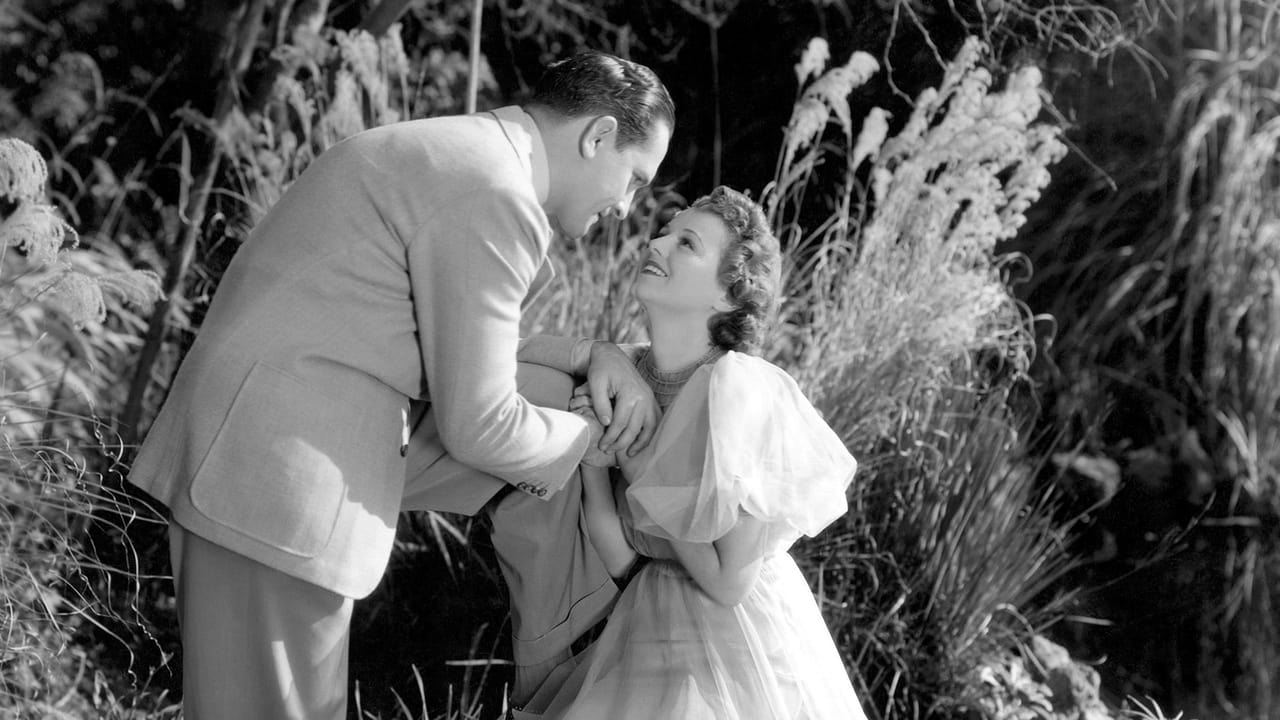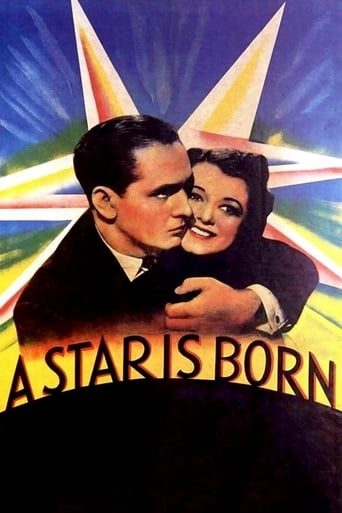

This said though, the 1954 Judy Garland film is still a fine film with timeless songs and Garland's best ever performance. Both are streets ahead of the 1976 Barbra Streisand version where the only outstanding things are three of her songs and her singing, the rest is an example of a film with a couple of other small pluses and too many big minuses. This version from 1937 is wonderful, it is too short and it is a case of the second half is better than the first half(though this is more an even better rather than a significantly better) but there's still plenty to love. The early strip Technicolor is ravishing, and the film looks just as lavish as the 1954 film with a real Hollywood behind-the-scenes feel. It's beautifully scored too, you don't have those truly great songs from the 1954 which is a pity in a way but when everything is done as well as it is you don't miss them either. The screenplay has since become classic status, and with dialogue that is vibrant, witty, heart-breaking and caustic along with one of the greatest ever last lines it is very easy to see why. It is the story mainly where this scores a little over 1954(very close together these two are), the pacing is more fluid, the storytelling is perhaps more sensitive and I found myself moved more, the ending is genuinely poignant. The drama is hugely compelling in the second half, aided by William A Wellman's intelligent direction, the first half is not quite so much but unlike the 1976 film hardly is it a slog either. The performances are top-notch, Adolphe Menjou and Lionel Stander coming off the best in supporting roles, of the three films it's this version with the most well-fleshed-out characters in my opinion. Janet Gaynor is eclipsed by Judy Garland, but does wonderfully in her own way, her character is the kind that goes on a journey(literally and in character) and Gaynor captures that youthful naivety developing into maturity very well. Best of all is Fredric March in one of his finest performances, a more meaty role than Gaynor's but one done with great theatrical command and touching nuance. One of the best things about this film absolutely. The two do have good chemistry and you do at least believe what the two characters individually and together are going through, it's done a little better in the 1954 film but you don't get any of this at all in the one from 1976. To conclude, poignant, lavish, beautifully performed and superbly written, a great film and the best version. 9/10 Bethany Cox
... View MoreThis movie has been done three times: this one in 1937, then in 1954 and finally 1976. I've now seen only this original, and only because I wanted to see a young Janet Gaynor for the first time. Beware, however: a 2012 version is now in pre-production; although, as we all know, it may never be completed – Hollywood being what it is.Of course, this story – rags to riches in the acting business - was done first by others – principally Katherine Hepburn in Morning Glory (1933) and, oddly enough, again in Stage Door (1937), and again with Katherine Hepburn ably assisted by a host of well-known Hollywood actors, including the tireless Adolphe Menjou who never seemed to mind playing a Hollywood boss, in this and many other similar movies. The difference with Star, of course, is it's maybe the first movie to dig into Hollywood screen acting and make an attempt to lay it bare.So the story is banal, as most rags to riches fantasies are. Equally, however, it's an exceptionally well-done narrative that strips the gloss off Hollywood – in a genteelly, low-key manner – to show 1937 viewers just what it took to claw your way to the top. And, let's face it: being released in the dog days of the Great Depression and as America geared up for war, audiences of the day lapped it up. Hard times and war drums were on the way again: the people needed to see rags to riches in action, needed to know that hardship and sacrifice were just around the corner. And, failure was not an option.Today's mainstream audience, on the other hand, would probably laugh at the perceived and implied naivety of the 1930s crowd.The acting – from Frederic March as Norman Maine (the main actor in the story – such an appropriate name!) who is already on the slippery slopes to alcoholic and acting oblivion just as he meets and falls in love with Janet Gaynor as Esther Blodgett as the aspiring Hollywood wannabee; and both ably assisted by Adolphe Menjou as Hollywood producer, Oliver Niles – raises it to the level of simplistic melodrama and without descending into bathos, fortunately. And that's largely due to March, who is outstanding – literally and figuratively – as the actor with everything to lose. Menjou does his usual, highly professional turn – and never misses a turn or beat. And Gaynor? Well, I'd say she was perfectly cast as the newcomer who makes good, to a point: her down-to-earth, home-spun, wide-eyed trusting nature is personified with her looks, tone and carriage – almost to the point of outdoing Shirley Temple.Oddly enough, though, Gaynor made her last movie in 1938 and did not reappear until 1957, with a guest appearance in Bernadine with Pat Boone, whom some would remember.This production of Star, in color, certainly appeals to the visual senses, displaying the lavishness that beckoned neophytes and to which stars become accustomed, all too easily. In contrast, it also shows – with comedy or gentle satire – the daily grind of making movies and is, perhaps, the genesis of the much over-use of out-takes, bloopers and so on in some of today's productions. Photography, editing and script – particularly the last – are all up to scratch, as you would expect from a Selznick/Wellman venture. Dorothy Parker – who wrote the screenplay and who was one of literature's bete noire of the 1930s set – constructed some of the most memorable lines in Hollywood history, especially those from Menjou. Worth seeing just for that alone, in my opinion.Interestingly and coincidentally, Nathanael West – one-time Hollywood screen writer – published The Day of The Locust in 1939, a novel that takes the Star story and twists it into a horrific nightmare. Not until 1973, however, did John Schlesinger direct a screen version of the same name that has not been repeated; see that one and find out why. Not to be outdone, David Lynch, film noire auteur extraordinaire, has gone one further with Muholland Drive (2001), arguably the ultimate screen statement to date about the prostitution of screen art in the pursuit of fame and fortune, and one of the grittiest horror stories ever put to film. Considering some of the scenes of both, I wouldn't at all be surprised if Lynch has seen this version of Star.As a significant piece of Hollywood history, this 1937 version should be seen by all film lovers and the starry-eyed. Highly recommended.Then, come down to earth with The Day of The Locust and deliver a coup de grace with Mulholland Drive, both of which I've reviewed for this site. Enjoy.
... View MoreThis is a very good film with a great cast. I've seen reviews stating this film pales in comparison to the remake, due to the fact that you get to 'see' that Judy Garland's character can sing, but you don't get to 'see' that Janet Gaynor's character can act. This is where I think the point of what this story is meant to portray is being lost by the viewer. The title isn't referring to the 'meteoric rise' of the female character, it is referring to the tragedy she endures, and how she chooses to overcome it that brings the birth of the 'Star'. In a way, Norman Maine gave his life for his wife to be born, he felt he was hampering her career and her life, so he wished to free her. Janet Gaynor was a star long before this movie came out, so it is really unfair to state that one can't believe she didn't appear to be someone that could have made such an impact in Hollywood. She'd been playing the naive type for quite some time, she played it well here, but she, also, portrayed her progressive maturity quite well and quite believably. As for me, this version shines far above the remake, because of the main character portrayals and for the outstanding supporting cast. This movie focused on the Gaynor character's experiences influenced by those around her, mostly with March's character. The remake seemed, to me, to focus mostly on the Garland character a little too much, not really getting the feel of those around her other than James Mason's character, but even it wasn't as deeply explored and conveyed as the Norman Maine character of the 1937 version. This is not taking anything away from Mr. Mason's performance, because there's no doing that, he was a great actor. However, the Frederic March portrayal was more compelling due to the fact the script allotted him to be, plus, Mr. March was a wonderful actor, one of my all time favorites. Then, you, also, have Adolphe Menjou, May Robson, Lionel Stander, and Andy Devine, all giving stellar performances. When you have a great cast like this, with a script this well written and a great director like William Wellman (whom had some very, very great pre-codes under his belt), it's a win-win situation. This movie deserved it's best picture award. And just reading comments on this movie, especially, in regards to the ending of the Norman Maine character through to the end line, I tear up, so corny, but true. This was, and still is, a great film.
... View MorePerhaps, it's because of the crackling of the film, but the 1937 version of "A Star is Born," doesn't hold a candle to the musical version of 17 years later.Janet Gaynor, as Esther/Vickie, doesn't hold a candle to Judy Garland's interpretation of the same role. Fredric March is wonderful, but even he was eclipsed by James Mason in the Garland version.Gaynor seemed rather too shy for the part and there is a total lack of dramatic intensity on her part which was sorely needed.The 1937 film was in black and white and this may very well have been appropriate to set the moody dramatic stage. With the musical version, you needed the necessary color to highlight not only the musical numbers, but the emotional heartbreak as well.
... View More